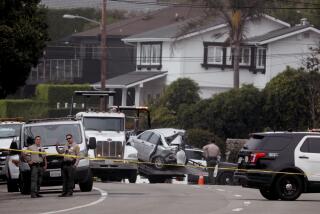Retrial Begins in Vehicular Murder Case : Crime: The four victims never had a chance, the prosecution charges.
- Share via
SANTA ANA — A prosecutor told jurors Monday that 36-year-old Pamela Trueblood and her children had no opportunity to avoid a collision when drunk driver Michael W. Reding’s car went out of control and crashed head-on into them seven years ago in Fullerton.
“Mrs. Trueblood never had a chance to swerve, or even brake, before being hit,” said Deputy Dist. Atty. Michael A. Jacobs in his opening statement at Reding’s re-trial on a murder charge.
Five years ago Reding, now 33, became the first defendant in Orange County to be convicted of second-degree murder in a vehicular death. But two years ago, the 4th District Court of Appeal threw out his conviction, based primarily on judicial error in permitting the jury to learn of drug-related evidence.
Prosecutors did not hesitate to try him again rather than agree to an appellate court offer that his conviction be reduced to vehicular manslaughter.
“The first jury thought he was guilty of murder. The facts are the same. Nothing’s changed,” Jacobs said before the trial.
Robert Trueblood, who lost his entire family in the crash on State College Boulevard, sat alone in court Monday taking notes on the proceedings. He sat through the entire first trial and said he was committed to coming back again for the retrial.
Reding, who was an engineer at Northrop Corp., had been drinking at a bar called Laredo’s for two hours before the collision. The bartender testified that Reding had about six beers and several kamikazes, a mixed drink made with vodka.
Although the speed limit was 45, Reding was traveling at least 70 miles an hour when he began to pass a vehicle ahead of him on an isolated stretch of State College, witnesses said. He then cut back to the center divider, crossed it, and struck Trueblood’s car head-on as she returned from a gymnastics class at Cal State Fullerton.
Reding and two other young children in the other car were injured. Killed were Trueblood and all of her children, Eric, 11, Kerry, 9, and Scott, 8. Reding’s blood alcohol content was slightly above 0.10, the legal limit to determine whether a person is drunk.
At his first trial, Reding testified that he had been drinking and that just before the crash, he had been fiddling with the tape deck his car. He told the jury that he looked up, saw he was approaching a vehicle ahead of him too quickly and cut to the right.
Then, he said, he had to cut back sharply to the left to avoid an embankment, but he crossed the divider instead and struck the Trueblood car.
One of those in the car ahead of him testified Monday that Reding’s car “sounded like an engine that was floor-boarded” when he started to pass.
Reding’s attorney, Deputy Public Defender Michael P. Giannini, described Reding to jurors in his opening statement as “the only son of a very typical Orange County family.” Giannini said evidence would show that it was impossible to know exactly how fast Reding was traveling when the crash occurred.
For Reding, the difference in sentencing between vehicular manslaughter and second-degree murder varies greatly, depending on the judge and the state corrections system.
His original second-degree murder conviction carried a 15-years-to-life penalty. Four vehicular manslaughter convictions could result in about 15 years. But lawyers involved say the difference between the two could be about four or five years.
Reding already has served five years.
More to Read
Sign up for Essential California
The most important California stories and recommendations in your inbox every morning.
You may occasionally receive promotional content from the Los Angeles Times.












